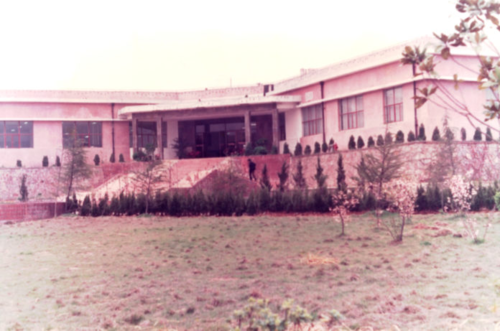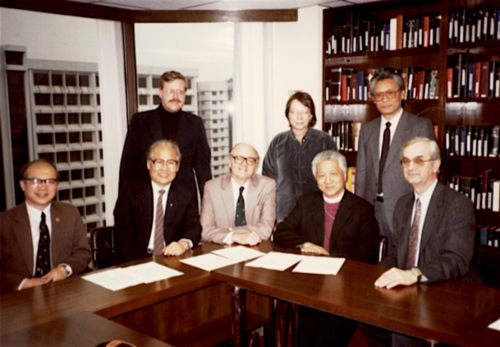This year marks the 100th anniversary of the first edition of the completed Mandarin Union Version Bible. Instrumental in the distribution of this Bible in China has been Amity Printing Press in Nanjing. Home to the world’s largest Bible printing press, Amity Printing Company in China prints millions of Bibles each year for Chinese Christians and for Christians around the world. This article by UBS China Partnership, reposted with permision by China Christian Daily, details how Amity came to be.
How World’s Largest Bible Printing Press Was Established in China

Amity Printing Press opened in Nanjing in 1987.
(UBS China Partnership )
You may know that with 1.38 billion people, China is the world's most populous country in the world. But did you know that it is also home to the world's largest Bible printing press—Amity Printing Company?
The press began operating in 1987 and Amity Printing Company (APC) was established in 1988 in a joint venture between Amity Foundation (AF), a charity foundation set up by Chinese Christian leaders, and the United Bible Societies (UBS). Its mission is to give priority to printing Bibles for Chinese Christians and churches.
Recently, the joint venture agreement between Amity Foundation and United Bible Societies in APC was just extended and this ensures Bible printing in China will continue with the support of UBS, making the Word of God affordable, accessible and available in China.
Since its inception three decades ago, APC has been fulfilling the Scripture needs of millions of Chinese Christians across China through printing Bibles for distribution by the church in China. Coinciding with the establishment of APC is the exponential growth of the church in China.
How did a Bible printing press get established in China in the 1980s when just a decade before churches were closed, Bibles were banned, confiscated, and burned during the Cultural Revolution? Who were those involved in this modern-day Bible miracle?
How It Started
It all started with a friendship forged between Dr Eugene Nida, an eminent Bible translation consultant with the American Bible Society and Bishop K. H. Ting, President of the China Christian Council. Dr Nida had been invited to teach in Nanjing and during each of his visits, he had the opportunity to make contact with Bishop Ting and introduce the work of Bible Societies.
What followed was a visit in April 1981 by Bishop Ting and Dr Han Wenzao, General Secretary of Amity Foundation to Hong Kong to meet with UBS Asia Pacific leaders—Rev Chan Young Choi, UBS Asia Pacific Regional Secretary and Dr I-Jin Loh, UBS Regional Translation Consultant.
This visit came less than two years after the first church was re-opened in 1979 after the end of the Cultural Revolution and the launch of the Chinese government's Reform and Open Door policy.
The church had resumed printing Bibles at the People's Liberation Army (PLA) Printing Press in Nanjing but the press was not able to meet the huge needs of the church and could not give priority to Bible orders.
By this time, the China Christian Council/ Three Self Patriotic Movement (CCC/TSPM) had been established as the twin organization to coordinate the work and activities of the churches in China.
The relationship between UBS and CCC/TSPM began with that visit, with both sides expressing the desire to further develop their relationship, thus laying the premise for future cooperation and partnership.
Subsequently in 1982, leaders of the CCC/TSPM visited German Bible Society and British Bible Society to learn more about the mission and work of the Bible Societies. Bishop Ting and Dr Han then visited Australia in 1984 where they were warmly welcomed by Rev James Payne, Bible Society Australia's General Secretary and UBS Executive Committee Chairman.
In January 1985, during a Nanjing banquet held in honor of Rev Chan and Dr Loh, Bishop Ting first announced the idea of establishing a Bible printing press—to print Chinese Bibles on Chinese soil for Chinese Christians.
It was also at this meeting (before the establishment of APC) that UBS was asked to support the printing of 100,000 Bibles at the PLA Press. UBS acted swiftly and donated the first 100 tons of Bible paper which arrived in Nanjing shortly.
In the following month, a landmark meeting in Hong Kong took place between the leaders of UBS and CCC/TSPM to further discuss the feasibility of setting up a printing press—with Rev James Payne, Rev Dr John Erickson, Rev Chan Young Choi, Dr I-Jin Loh and Mr David Thorne representing the UBS and Bishop Ting, Dr Han, Rev George Wu, the CCC/ TSPM.
A month later, in March 1985, the Amity Foundation and UBS signed a Memorandum of Understanding with the latter announcing the intention to establish and equip a printing plant in Nanjing which would give priority to printing Bibles. This was just within three months since Bishop Ting first suggested the idea at the banquet!

March 1985 meeting in Hong Kong. L-R: 1st row Dr Han, Rev Chan Young Choi, Rev James Payne, Bishop Ting, Rev Dr John Erickson. 2nd row: Dr Philip Wickeri, Mrs Wickeri, Dr Loh.
(UBS China Partnership )
How It Was Financed
But where was the money going to come from? With the agreement signed, UBS immediately announced the "Bible Press for China" Project and officially launched a fundraising campaign among the fellowship. It was to be the largest fundraising effort the Bible Societies had ever undertaken then.
Mr. Geoffrey Hill, UBS Finance Director wrote, "The Bible Societies see the invitation . . . as a God-given challenge to which they want to respond in a way which is appropriate to the immensity of the need."
Within the next two years, 36 Bible Societies representing churches from all over the world responded and contributed a total of US $7.3 million for the purchase of machinery and as start-up capital for the press. It was nothing short of a true spirit of giving and fellowship in Christ that made the press possible.
A historic moment came when Bishop Ting laid the foundation stone for the press on 8 November 1986 in the presence of General Secretaries and fundraisers from 10 UBS member societies. It was a special moment for all of them but it would not be the last one as the blueprint for the building was drawn up, construction began and printing equipment arrived from different parts of the world to Nanjing.
A ceremony was held in July 1987 to present the printing equipment to Amity Foundation as a gift. Printing Bibles in China was becoming a reality. History was in the making.
When It Became a Reality
Less than one year after Bishop Ting laid the foundation stone for the factory, the first Bible rolled off the printing press on 14 October 1987.
During the official opening of the 6000 square-meter press, Rev Dr Ulrich Fick, UBS General Secretary noted that the Chinese church had made the Bible truly their own book, "not foreign or imported but printed and bound by Chinese here in China and circulated to Chinese."
In 1988, the Amity Printing Company Ltd (APC) was formed through a joint venture agreement between Amity Foundation and the UBS. Rev Dr John Erickson, Chairman of the UBS Executive Committee said, "The UBS is committed to continue the supply of resources unavailable in China at present, such as Bible paper, and to the development and maintenance of the press."
With donation of Bible paper from the UBS, orders from the CCC/ TSPM kept pouring in as many Chinese Christians were snatching up the Bibles. Many were owning it for the very first time or were waiting to own it as their old copies had been confiscated.
A 76-year-old Christian lady said at that time, "Twenty years ago, my Bible was taken away from me. In my heart, I cried for 20 years. Now at last, God has brought me a Bible."
Bishop Ting commented in 1988.
The Chinese Christians are Bible-loving Christians. The place in their lives that Chinese Christians give to the Word of God reveals itself in the brightness of their eyes when receiving a Bible. We are thankful to God and to the Bible Societies in 110 countries for enabling us through the UBS to have in the Amity Printing Press, a tool for meeting the need for Bibles in China. Bishop Ting commented in 1988.
Soon, the press printed its one millionth copy of the Bible in October 1989, two years after the first copy!
And in 2012, the 100 millionth copy was reached. Henceforth, millions in China have been blessed with the life-giving and life-changing Word of God.
Reflecting on the amazing story of the APC, Mr Kua Wee Seng, UBS China Partnership Director, remarked,
The establishment of the Amity Press testifies to the sovereign grace of God working through his faithful servants and through the prayers and support of his people all over the world.
We salute especially the pioneers of the Amity Press project, the Chinese church leaders and UBS leaders, for their mission and vision, their faith and courage, their commitment and perseverance, setting up the Bible printing press in China against all the odds and amid great uncertainties and difficulties in the 1980s.
May we look to the same Sovereign Lord and act with the same faith and courage of the pioneers to forge ahead and write the next chapter of the Bible mission in China.
The Call Today
Today, APC is situated in a new and bigger location with high speed, state-of-the-art printing equipment, run and operated by 500 staff. The new 85,000 square meters facility is capable of printing more than 20 million copies of the Bible a year, and is currently producing an average of one copy per second!
As of 2018, 80 million copies of the Bible have been printed for the church in China, both Protestants and Catholics while 100 million copies have been printed for overseas churches.
To bless the Chinese Christians of whom the majority are living in rural areas, UBS have been supporting the church in China since 1987 by donating the Bible paper needed for Bible printing, bringing the retail price down.
Making Bibles affordable has also enabled Chinese Christians to buy them as gifts to bless their family and friends with the Word of God, a common practice in outreach by the Chinese Christians.
Churches are also able to give free copies of the Bible to newcomers, seekers, and newly baptized members of the church. Hence, it remains critical that UBS continues to support the printing of Bibles in China.
Thirty years after the first call by the church in China to print Bibles in China, the same call is still sounding today to bless China, a country comprising 24% of the world's non-Christian population, with the Word of God.
In an interview with the late Elder Fu Xianwei, former Chairman of National TSPM of the Protestant Churches in China, in 2016, he said:
Believers in China are very much in need of Bibles. They love the Bible very much . . . the most critical group is believers in the poor areas, they face real economic difficulty. So are their churches, which are unable to help them. To help them own a Bible, we will need Bible paper donation from UBS.
Will we respond to the call "quickly and gladly" as did those who have gone before us?
Original Article: “We Followed this Call Quickly and Gladly” by Cynthia Oh, reposted with permission as "How World’s Largest Bible Printing Press Was Established in China" by China Christian Daily .
Edited and reposted with permission.
Editor's note: When first posted, this article was mistakenly attributed to China Christian Daily. It has been edited to acknowledge the original source to be UBS China Partnership and written by Cynthia Oh. We apologize for the mistake and confusion. Updated May 15, 2019.


